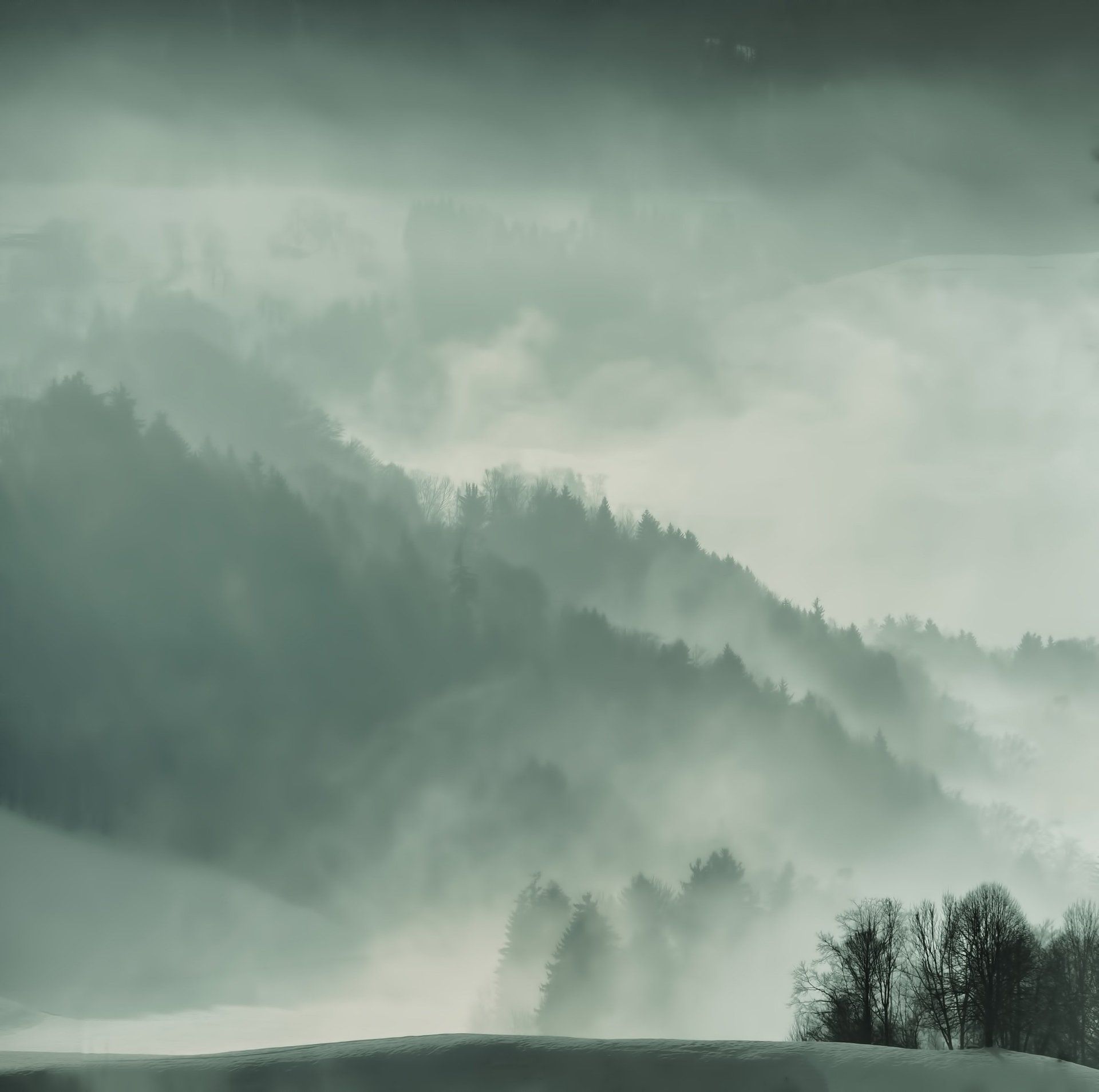Mystery
Exploring Mystery I
Truly, we live with mysteries too marvelous
to be understood.
How grass can be nourishing in the
mouths of the lambs.
How rivers and stones are forever
in allegiance with gravity
while we ourselves dream of rising.
How two hands touch and the bonds will
never be broken.
How people come, from delight or the
scars of damage,
to the comfort of a poem.
Let me keep my distance, always, from those
who think they have the answers.
Let me keep company always with those who say
“Look!” and laugh in astonishment,
and bow their heads.
~Mysteries, Yes
Mary Oliver
Yesterday, I was driving a dry road from McCall, Idaho. This morning I sat in my library looking out the window at the weather. Winds swirl, snow falls, accumulates, is swept up and falls again. Everything is white or tinged with white highlights. The world has seemingly, mysteriously changed. I’ve been inspired lately by the insightful book The Art of Pausing to develop a practice of writing a haiku poem each day. This is what I wrote this morning:
I’m glad to be home.
Outside wind and snow struggle
Inside, I snuggle.
Weather remains a mystery to me. Yes, I know about chaos theory, the effect of one butterfly flapping its wings somewhere is causing my toe to itch, but still….
These days the weather forecasts, because of research, invention, and experience, get better and better. The metaphysicality of nature, the ineffable, becomes more material, more predictable, as science does it’s work. But the mystery of nature, from whatever perspective I can take it, continues.
Consider The Canticle of the Creatures (AKA the Canticle of the Sun) written by my favorite Saint, Francis (see a version of the canticle below). Francis praises the sun, the moon, the stars, the wind, water, fire, the earth, and death. Consider pagan rituals (see an example invocation below) call upon the qualities of nature – such as air, earth, water, fire. Consider that no matter how much we try to understand nature, the weather, observable phenomena, “What we see of the world is only a sliver of what’s ‘out there’(Gleiser, 2014, p. xiii).
We can see just a sliver. Just a bit. And that's just of the physical world. Not to mention libraries and databases and centuries of tradition and experience that we don't even know exists, much less have mastered.
Yet so many of us, me included way too often, act like know-it-all's , like we have a monopoly on the truth, like we are "right". Now, to turn a phrase, that's regressive.
The opposite of humble.
Marcelo Gleiser is the Appleton Professor of Natural Philosophy and Professor of Physics and Astronomy at Dartmouth. I have been pondering what he – a scientist – says about mystery. “We strive toward more knowledge, always more knowledge, but must understand that we are, and will remain, surrounded by mystery…it is the flirting with this mystery, the urge to go beyond the boundaries of the known, that feeds our creative impulse, that makes us want to know more” (p. xiv).
My working proposition, subject to the infinite amount of knowledge and wisdom I don’t have, is that mystery, like awe and wonder, is one of those touch points where science and religion, at their best, intersect. This is an intersection I want to learn more about. There are different ways to look at mystery, the mysterious, just for starters. Therefore, I’m going to write about it. You may see my views evolve over time. They seem to do that, which is both humbling and enriching. You may call me someone who “flips” if you wish. I consider it being open to new information, new experience, and new ways of looking at the world.
In this short essay, I’ve teed this topic up with nature. The beauty and inspiration and epiphanal qualities of nature call to both scientific and spiritual minds. No matter how wonderful our ability to observe and to measure have become, our abilities will become ever greater - and yet they will still never be able to penetrate completely or even a nano part of the unknown.
As Gleiser says, “What we see of the world is only a sliver of what’s ‘out there.’ There is much that is invisible to the eye, even when we augment our sensorial perception with telescopes, microscopes, and other tools of exploration. Like our senses, every instrument has a range. Because much of Nature remains hidden from us, our view of the world is based only on the fraction of reality that we can measure and analyze” (p. xiii).
I think that faith, as Mary Oliver suggests above, involves taking the risks of questioning, doubting, exploring, testing, and stepping into the unknown. “To go beyond the known, both Newton and Einstein had to take intellectual risks, making assumptions based on intuition and personal prejudice. That they did so, knowing that their speculative theories were necessarily faulty and limited, illustrates the power of belief in the creative process of two of the greatest scientists of all time” (Gleiser, p. 7, italics added).
Belief and trust in the process of going deeper, testing assumptions, looking differently, has the potential in realms of science and the spirit to move in more profound circles of being and knowing.
How fun is that?
“Religious myths attempt to explain the unknown with the unknowable While science attempts to explain the unknown with the knowable.” ~Marcelo Gleiser, The Island of Knowledge, p. 3
References:
Gleiser, M. (2014). The island of knowledge: the limits of science and the search for meaning . New York, Basic Books, a member of the Perseus Books Group.
Mysteries, Yes, This is from Evidence: Poems by Mary Oliver, published by Beacon Press, 2009
Two Examples Of Many, Many Ways Religion and Nature have been described:
The Canticle of the Creatures
by
St. Francis of Assisi
Most High, all-powerful,
good Lord,
yours is the praise,
the glory and the honor and every blessing.
To you alone, Most High,
do they belong,
and no one is worthy
to speak your name.
Praised be you, my Lord
with all your creatures,
especially Sir Brother Sun,
who is the day through whom
you bring us light.
And he is lovely, shining
with great splendor,
for he heralds you, Most High.
Praised be you, my Lord,
through Sister Moon and Stars.
In heaven you have formed them,
lightsome and precious and fair.
And praised be you, my Lord,
through Brother Wind, through
air and cloud, through calm
and every weather by which
you sustain your creatures.
Praised be you, my Lord,
through Sister Water,
so very useful and humble,
precious and chaste.
Praised be you, my Lord
through Brother Fire,
by whom you light up
the night, and he is
handsome and merry,
robust and strong.
Praised be you, my Lord,
through our Sister, Mother Earth,
who sustains us and directs us
bringing forth all kinds of fruits
and colored flowers and herbs.
Praised be you, my Lord
through those who forgive
for your love
and who bear sickness and trial.
Blessed are those
who endure in peace,
for by you, Most High,
they will be crowned.
Praised be you, my Lord,
through our Sister Bodily Death
from whom no living being
can escape.
How dreadful for those
who die in mortal sin!
How blessed are those she
finds in your most holy will
for the second death
can do them no harm.
O praise and bless my Lord,
thank him and serve him
humbly but grandly!
Wicca Rituals: Standard Opening and Closing for Beginning Wiccans
Invocations
Start in the North, hold up your hands (wand, athame, etc.) and say:
Powers of the North; powers of Air,
Send your winds of knowledge and wisdom
To bless us and enlighten us in our circle.
Hail and welcome, powers of the North.
Go to the East, hold up your hands (wand, athame, etc.) and say:
Powers of the East; powers of Earth,
From your fertile ground may we draw growth and stability,
To bless us and strengthen us in our circle.
Hail and welcome, powers of the East.
Go to the South, hold up your hands (wand, athame, etc.) and say:
Powers of the South; powers of Fire;
May you bring your spark of courage and inspiration,
To bless us and impassion us in our circle.
Hail and welcome, powers of the South.
Go to the West, hold up your hands (wand, athame, etc.) and say:
Powers of the West: powers of Water;
May your intuition and sensitivity wash over us
To bless us and transform us in our circle.
Hail and welcome, powers of the West.












